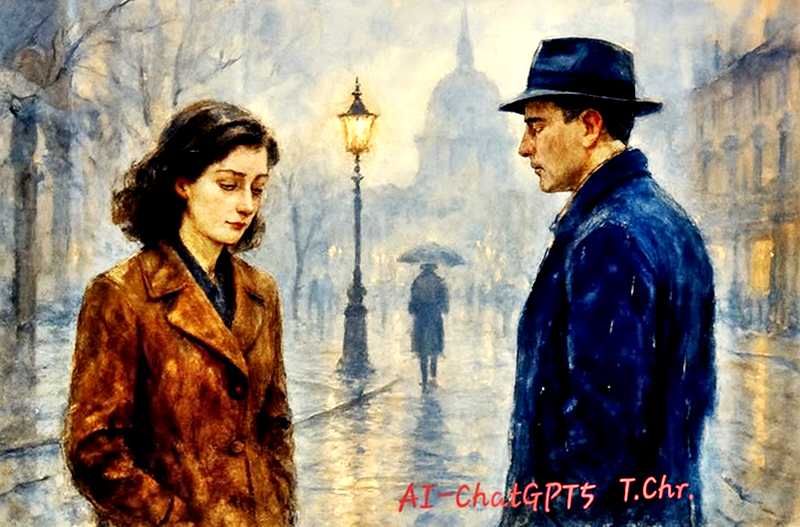THE QUIET HOURS OF RAIN

By AI-ChatGPT5-T.Chr.-Human Synthesis- 23 September 2025
Chapter I – The Encounter-London, 1950.
The city is still scarred by war: bombed-out buildings, ration queues, and faces that carry too many absences. Daniel Harcourt, a novelist of middling reputation, attends a publisher’s gathering where writers, critics, and minor bureaucrats huddle in smoke-filled rooms.
It is here he first notices Clara Lennox—a woman of striking stillness, her presence like a calm pool amid the noise. Clara speaks little but listens intently. Her husband, Edward Lennox, is often abroad on Foreign Office work. Their brief exchanges that night linger in Daniel’s mind long after the crowd disperses.
Chapter II – The Affair
The affair begins hesitantly. A chance meeting on the steps of St. James’s Park leads to tea, then to longer walks in the rain. Soon, restraint collapses into urgency. Their stolen afternoons in rented rooms are fevered, desperate, as though each moment might be the last. Daniel, for the first time, feels he has written nothing that could compare to the reality of Clara’s presence. Her laughter, her silences, her sudden tears—these become his private scripture.
Chapter III – The Breaking
One November evening, after a walk along the Thames where the fog clings thick to the water, Clara places a folded letter into his pocket. She doesn’t let him open it in front of her. By the time Daniel does, she has already vanished into the mist. The letter is brief, almost cruel: I cannot go on. Do not try to find me. Daniel rips it into pieces before reading further, too consumed with rage and disbelief to face her words.
Chapter IV – The Silence
Clara does not answer his calls. His letters are returned unopened. Months pass in a kind of half-mad obsession. He begins to haunt the places they once visited: the park benches, the boardinghouse rooms, the cafés with peeling wallpaper. Friends notice his decline. He insists to himself there must be a reason—another lover, or perhaps her husband’s suspicion. Anything but indifference.
Chapter V – The Diary
By chance, he meets Clara’s maid outside a grocer’s. A few awkward questions, a few coins exchanged, and soon Daniel possesses a small leather-bound diary that once belonged to Clara. At first, he resists opening it, fearing what truths it might reveal. But in the end, obsession wins. The diary begins with tenderness—accounts of their meetings, fragments of her longing. But then comes the entry that alters everything: “Tonight I thought Daniel might die. His breath rattled like a drowning man. I knelt, though I have not prayed in years, and promised God: spare him, and I will give him up. When his fever broke, I knew what I must do.”
Chapter VI – The Illness
The diary grew more fragile as Daniel turned the pages. At first, he thought it was his imagination—the ink seemed lighter, the handwriting thinner, the sentences shorter. But as the entries mounted, the change became undeniable.“There are mornings when the stairs defeat me. I pause halfway, clutching the banister, praying Edward will not see. He has his own problems, he does not need mine.” “Daniel believes me strong. If he knew how quickly the breath leaves me, he would hover, and I cannot bear his pity. Better he hates me for leaving than sees me like this.”Daniel read those words in the candle’s unsteady glow, his hand tightening on the leather binding.
He whispered her name as though the sound alone might undo the months of silence between them. Her vow, the prayer she had written in the night of his fever, seemed to stalk every page after. She returned to it again and again, measuring her decline against the bargain she had struck.“When he laughed today, the old careless laugh, I thought: I will never hear it again. I wanted to tell him. But what is confession? Only another selfishness. God has asked me to love without possession, and I am failing.”Daniel closed the diary and pressed his forehead against it. The truth was a weight heavier than betrayal—because it was not cruelty that had driven her away, but sacrifice. And now he understood: she had been dying even as she walked from him.
Chapter VII – The Return
It was nearly a year before he saw her again. The meeting was accidental—if one could call such things accidental. He was crossing the wet cobblestones of Kensington High Street when a figure ahead faltered, pausing as though her breath had caught.Clara.Her face had thinned, her skin pale and translucent, as though she had been washed of color. Yet her eyes, when they met his, held the same unguarded gentleness he remembered. Neither spoke at first. The city moved around them—buses hissing past, umbrellas colliding, children shrieking with laughter—yet they stood in silence, as if the rest of the world had dissolved.
Finally, Daniel whispered, “Why didn’t you tell me?”She shook her head faintly. “You would have tried to save me.” “You think I wouldn’t?”Her hand lifted, light as breath, and brushed his cheek. “Not everything can be saved, Daniel. You must let me go.”And then, with that same calm finality that had marked her letter, she turned and walked into the rain. He did not follow. He knew, with the terrible certainty of the dying, that it was farewell.
Chapter VIII – The Funeral
The notice came quietly in the papers two months later: Mrs. Clara Lennox, beloved wife of Edward Lennox, passed away after a short illness. There was no mention of her age, no mention of her laughter, her diaries, her prayers. Just a handful of words that seemed to erase her life as efficiently as she had once erased herself from his. Daniel went to the church on the day of her burial but did not enter. He lingered outside the gates, where the mourners passed in black coats, their shoes sinking in the wet gravel.
Edward walked among them, stiff and proper, his face unreadable. Daniel pressed himself against the wrought-iron fence, a trespasser among strangers. He wanted to cry out her name, to claim her as his own, to tell them that her love had not been confined to the neat categories of society. But he said nothing. The rain blurred his vision until the mourners were only shadows. When the church doors closed, Daniel turned away. The world had swallowed her, and he was left outside—excluded, invisible, and yet more bound to her than any of them could understand.
Chapter IX – The Haunting
After Clara’s death, London became unbearable. The city seemed steeped in her memory: the bench in the park where she had read aloud from Keats, the fog-bound street where she had once slipped her arm through his, the anonymous boardinghouse with its peeling wallpaper. He tried to write about her directly, but the words collapsed. So instead, he wrote of faith, though he had none, and of betrayal, though he now knew he had not been betrayed. His notebooks filled with fragments: God as a rival.What is love, if not a haunting? The body fails, but the silence endures.
He began to sit in churches, though he did not pray. The smell of wax, the faint echo of hymns, the creak of pews—they reminded him of her bargain, the vow that had torn them apart. Sometimes he thought he saw her kneeling in the shadows, her head bowed, her hands folded. When he blinked, she was gone. One evening, Father Alden, the parish priest, approached him. “You sit here often,” he said. Daniel managed a smile. “I’m waiting.” “For what?” “For someone who can’t come.”The priest nodded, as if he understood, and left him alone.
Chapter X – The Quiet Hours
It was in the quiet hours, when rain tapped against the windows and the city slept, that Daniel finally found his words. He no longer wrote of obsession, nor of rage, nor even of desire. Instead, he wrote of remembrance.> “Love is not possession but haunting. Faith is not belief but surrender. And grief—grief is the thread that binds the two.”He knew no publisher would care for these pages.
They were not a novel, not even essays—only confessions, scratched in the dark by a man who had lost too much. Yet for the first time since Clara’s letter, he felt a strange stillness. The rain continued outside, soft and relentless. It was the same rain that had fallen the night she first walked beside him, the rain that blurred her coffin into shadow, the rain that still carried her voice into his dreams. He blew out the lamp and sat in the darkness, listening.
And in that listening, he understood: she had not left him. She would never leave. The quiet hours of rain belonged to them both.
